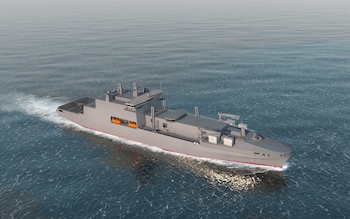
The Defence Secretary is seeking legal advice about a £1.6bn Royal Navy shipbuilding contract as the struggling British company hired for the work faces a Spanish takeover.
Belfast-based Harland & Wolff, which built the Titanic, was hired alongside Navantia, a Spanish state-owned shipbuilding giant, to build three Navy vessels but Harland’s decision to call in administrators last week has plunged the project into crisis.
John Healey, the Defence Secretary, and his team have asked civil servants to provide legal advice about the terms of the shipbuilding contract as the Ministry of Defence examines options for the fleet solid support (FSS) programme, a government-initiated plan to supply more Navy support vessels.
Harland is scrambling to find a potential buyer after calling in administrators, with Navantia seen as the frontrunner. Amid the turmoil, Admiral Sir Ben Key, the First Sea Lord, flew out to Cadiz two weeks ago for talks with Navantia executives.
However, unions are concerned that the Spanish company is interested in Harland’s Belfast yard alone. That leaves the fate of hundreds of workers spread across its three other sites – Appledore, Devon; Methil, Fife; and Arnish, on the Isle of Lewis – hanging in the balance.

They want the Defence Secretary to use the Government’s influence over the FSS contract to ensure any buyer of Harland takes on all four yards in an attempt to preserve jobs. Harland’s share of the deal, worth around £700m, is seen as the debt-ridden company’s most valuable asset.
Mr Healey is understood to have discussed the matter – among other issues – with representatives of the GMB union, one of his party’s most important backers, at the Labour conference in Liverpool earlier this week.
In a letter earlier this month, the union warned that any buyer should not be “allowed to cherry-pick what yards or contracts they wish to save”. And the Irish Congress of Trade Unions pressed this case in a meeting with officials from the Department for Business and Trade last week.
However, it is not clear what powers ministers have to interfere directly in the sales process. In theory, the appointment of administrators could entitle the Ministry of Defence to put the FSS contract back out to tender, according to the Sunday Times.
Against that backdrop, ministers are understood to have quietly commissioned advice from officials on their legal options. They are understood to be prioritising the delivery of the three Navy ships, which are meant to supply Britain’s aircraft carriers with stores and munitions from the early 2030s, on time and on budget.
Ministers are said to be focused on ensuring that national shipbuilding capacity would be preserved and that work promised to UK yards would be honoured. Unions have previously raised fears that the work could be entirely outsourced to Navantia’s yard in Cadiz if a rescue package for Harland is not agreed.

Under the original plans, Harland & Wolff and Navantia would each have fabricated various sections of the ships, known as blocks in their respective Appledore and Cadiz yards. These blocks would then have been taken to Belfast for final assembly, with the first in class entering service in 2031 and the last by 2033.
In the first two ships, the engine, superstructure and lower cargo blocks were to be fabricated by Navantia, with the upper and mid cargo blocks and the bow made by Harland & Wolff, according to documents seen by The Telegraph. Harland & Wolff was also set to build the lower cargo section for the third and final ship, with the rest built by Navantia.
The company’s troubles moved from a slow-burning concern to full-blown crisis in July when Jonathan Reynolds, the Business Secretary, refused to underwrite a £200m restructuring loan to the firm, amid concerns taxpayers would be exposed to unacceptable risk. That triggered the exit of former boss John Wood and the appointment of caretaker managers, including restructuring expert Russell Downs.
A spokesman for Harland & Wolff could not be reached for comment.
A government spokesman said: “We know this will be a concerning time for those affected and we are clear that, following a thorough review of the company’s financial situation, at present the market is best-placed to address these challenges.
“We are continuing to work extensively with all parties to find an outcome for Harland & Wolff that delivers shipbuilding and manufacturing in Belfast, Scotland and across the rest of the UK and protects jobs.”
Navantia declined to comment.
Disclaimer: The copyright of this article belongs to the original author. Reposting this article is solely for the purpose of information dissemination and does not constitute any investment advice. If there is any infringement, please contact us immediately. We will make corrections or deletions as necessary. Thank you.



